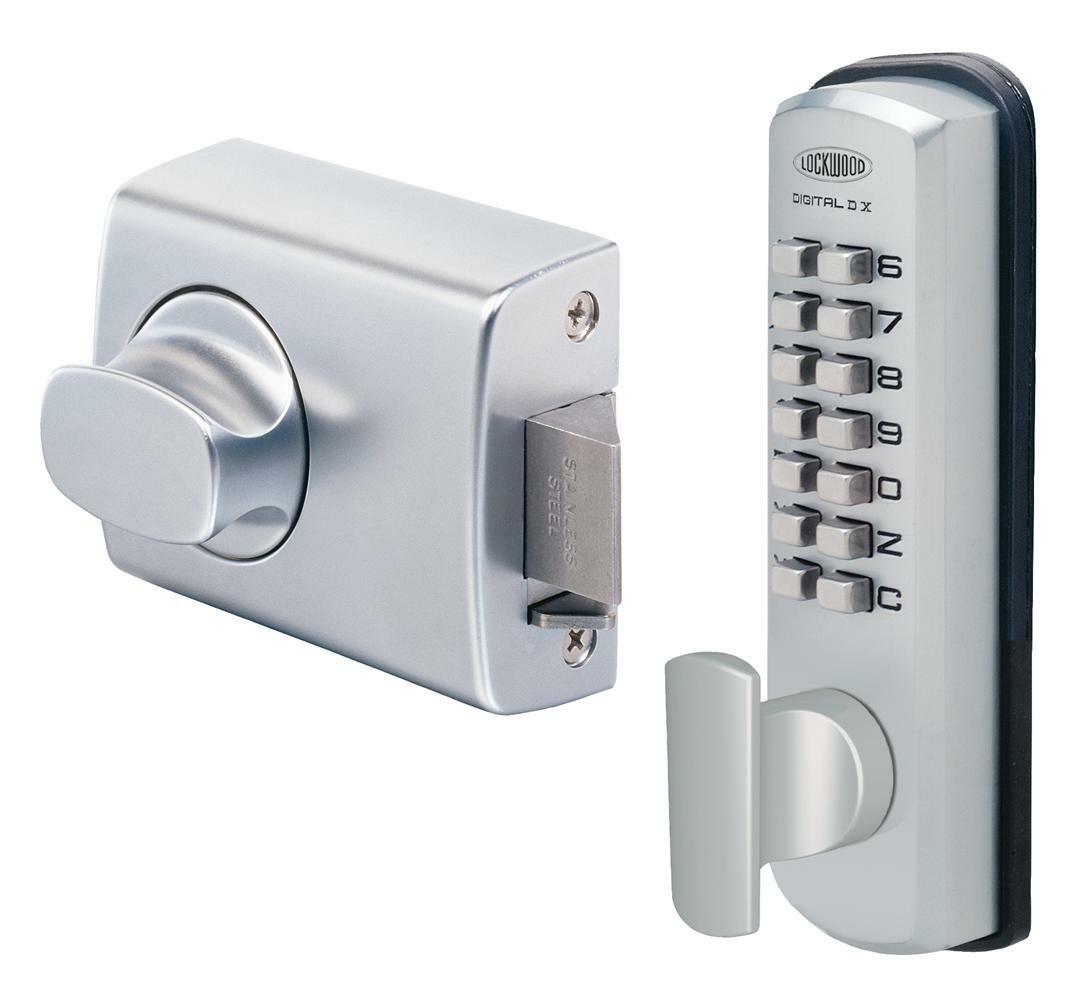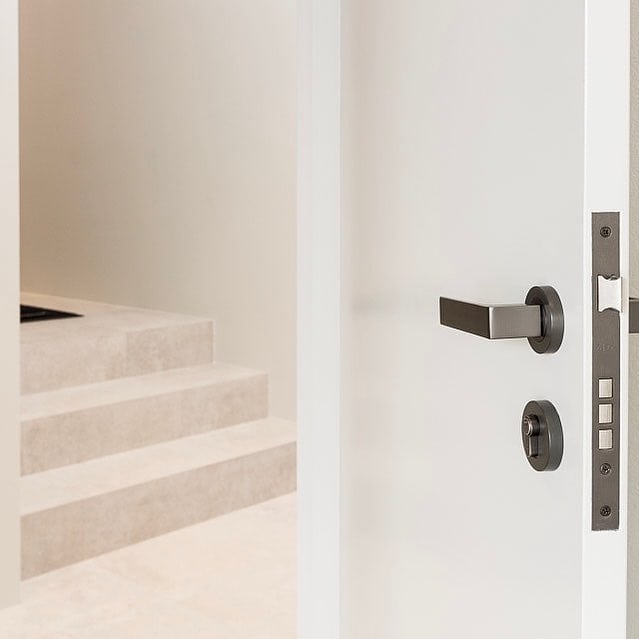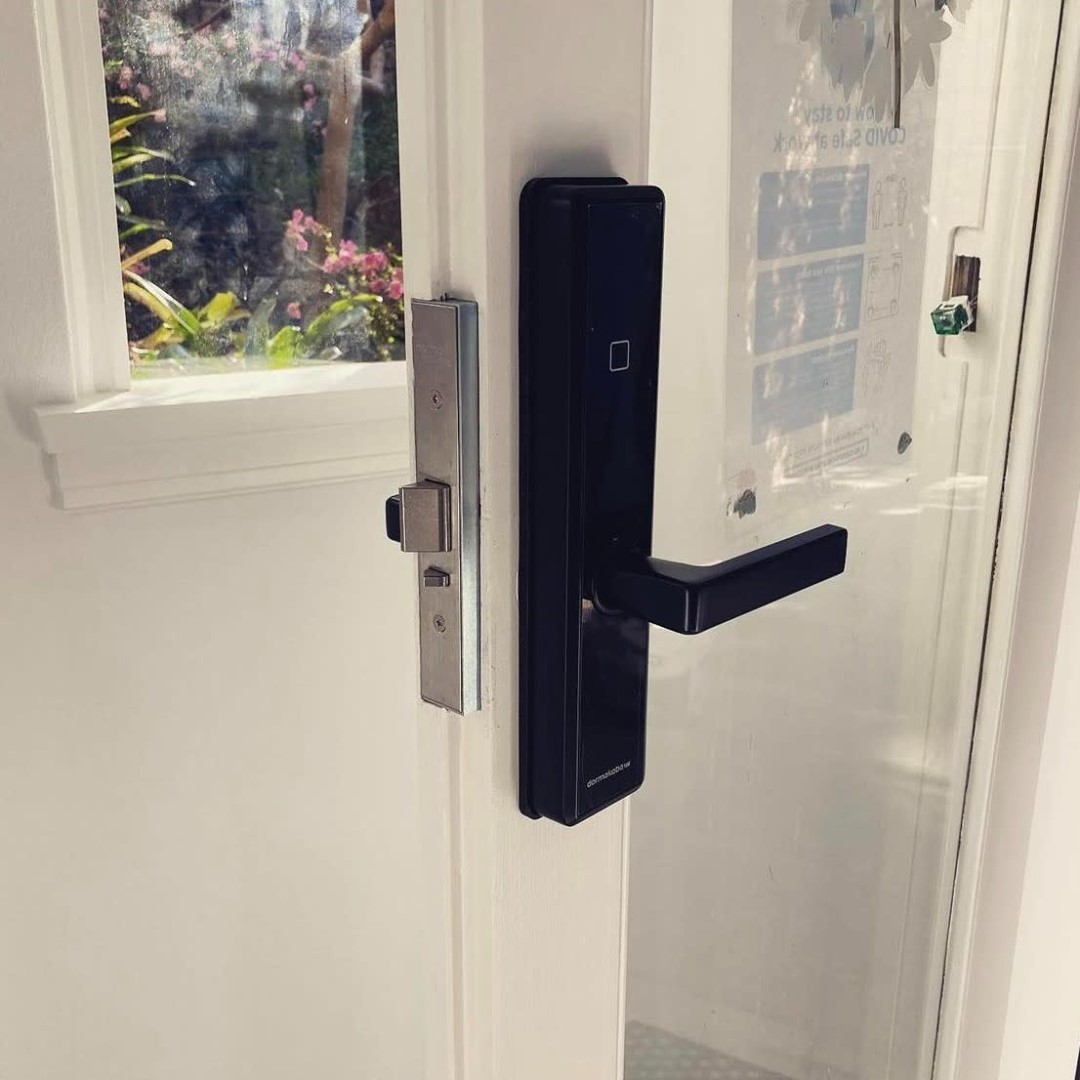
Australian Owned

Locally Stocked

FAST & FREE DELIVERY*

Phone support
Electronic (Digital, Smart) vs Traditional Door Locks: How to Select the Right Option for Your Property
Date Posted:17 January 2022
Once you have settled on designs, chosen doors, and are ready to select your locks, you will quickly realise the myriad of different options laid before you. Gone are the days with only a few mechanical options to choose from; modern technology has since introduced a range of smart, digital & electronic locks that have revolutionised the residential and commercial security industry.

But is this the right choice for your entire property?
How are you going to differentiate the locks between your front doors and, say, the bedrooms?
Are you looking for a modern or traditional look?
Do you have enough protection and systems in place to adequately safeguard your office and the equipment inside?
For many years, Keeler Hardware has been the preferred provider in Australia of premium hardware supplies, and to help in making your decisions, we have put together this guide on electronic vs traditional door locks, and how to select the right option for your property.
Purchasing for a New Property or Replacing Existing Locks?
Before we start exploring the differences in products available, it is important to first recognise your specific needs.
Is this purchase for your home, rental property, or commercial premises? Naturally, each of these options will come with different calls for security, aesthetics and investment. With your home, this will be the property you and your family spend a great deal of your time in, storing not only valuable memories but also your possessions. You may therefore wish to balance a desire to create a specific aesthetic style blend with prominent security features, altering throughout the property, from the front and back doors, to the bedrooms, to the home offices.
Rental properties, however, are more akin to business investments, and need to appeal to a wider market of tenants to ensure consistent occupancy. As such, your property portfolio may place greater emphasis on cost-effective, yet modern security to promote better return on investment, whilst not taking any ‘risks’ or ‘leaps’ with personal style choices.
Lastly, commercial premises, such as office workspaces, will likely house a range of technology and intellectual property that needs to have adequate protection. Top-line security measures paired with adequate control systems will ensure access is easy for large numbers of employees, but difficult for intruders.
Once you recognise what you are looking for, you can remove any pre-existing bias you may hold towards the products available, and make the right selection that balances the financial sum you are willing to invest, the style and themes you are looking to maintain throughout the property, and the security level you need to feel comfortable.
Traditional (Mechanical) Locks
Traditional, mechanical locks are the types we all grew up with. They operate by using a release mechanism, either in the form of a key, lever, knob or thumb turn. There are a variety of mechanical locks to choose from, including:
Passage and Privacy
Passage doors are generally not lockable but secured in the closed position via a tubular latch and operated by a lever or knob. Privacy doors have the addition of a locking capability with a button or thumb turn (you will see a privacy lock on most bathrooms, some bedrooms and home offices). Most privacy doors will have an emergency release, which allows the door to be unlocked in an emergency, however as a result is lower security.
Passage and Privacy doors are low-security due to their ability to open easily. They also offer a smaller rose (presence on the door face), meaning they are often available with decorative pieces.
Deadbolt
A standard deadbolt lock has a long cylinder running through the middle of it that allows for a key to be turned from either side, retracting and extending flat metal bars that run horizontally along its centre. These bars allow the door to be locked and unlocked by sliding into place, preventing the door from being opened until the correct key is inserted into the cylinder. Because of their design, these locks are typically used where security is a primary concern, such as in residences and small businesses, as they have been proven time and again to be extremely difficult to pick and bump, while also providing a high level of convenience (to those with keys).
Mortise Lock
A mortise lock is a type of mechanical lock that works by inserting a key into the keyhole and turning it to open or close the bolt.
Mortise locks are commonly used on front doors, which is why they're often associated with residences, but they can also be found in commercial buildings as well. They are typically mounted inside the door, allowing them to withstand abuse from natural elements such as rain and wind much better than other types of residential locks. When the door is shut, it is flush with the edge of the door frame. This provides the lock with more protection from being tampered with, and a seamless aesthetic.

Cylinder
A cylinder lock is a type of mechanical lock that uses a set of small, rotating metal pieces to open and close an internal chamber where a pin tumbler falls into. This typically makes it extremely difficult to open the lock without the proper key because there are several pins (typically 5 or 6) arranged in such a way that they need all be dropped into place at once before the main chamber can turn and open the lock. Without the correct key, turning the knob or lifting on a lever generally has no effect.
The main benefit of this lock is its ease to use. Cylinder locks usually require you to exert very little energy to open them up. These locks are also fairly easy to install. Cylinders are mostly used for low-security applications since they can be compromised with simple tools if needed. Another drawback of the standard cylinder lock is that they tend not to stand up well in conditions where there is high amounts of moisture or heat present for extended periods.
A double cylinder has key locking (and unlocking) functionality on both sides. A single cylinder has key locking on one side and a turn snib (or similar) on the other side
Smart vs Digital Door Locks
Many of us will now also have become familiar with electronic door locks that embrace intelligent, yet easy-to-use technology to improve functionality. There is a distinction, however, between the options on the market, on what is known as a ‘smart’ door lock, and a ‘digital’ door lock.
- Digital locks: despite utilising technological features, these locks still require a certain form of physical interaction to operate
- Smart locks: utilising connection capabilities through wireless or Bluetooth technologies, these locks can be operated using remote access, such as through a smartphone

Naturally, a range of options for electronic locks is now available on the market.
Keypad (PIN) Locks
Keypad or personal identification number (PIN) door locks are among the most common types of electronic locks used today. They do not require much technical experience to set up, with each user simply asked to enter their personal passcode before entering or leaving an area. The lock will automatically recognise any valid PINs that are pressed against it. Passcodes are typically four to six digits long and can be changed at any given time.
The applications are terrific for both commercial and residential environments. For example, business owners can either share secure codes with their teams, or entrust them to set up their own, to gain access. Landlords can refresh passcodes with every new tenant to improve the security of their property. Should this passcode be forgotten, however, it can cause issues, as it can be if an intruder learns the number, leading to the need for other methods of entry and override systems (which all will offer).
Bluetooth Locks
Locks with Bluetooth capabilities are extremely savvy pieces of technology that perform a range of functions. They can be operated with a mobile phone or smart device, sense when you are in range to unlock upon your approach, or provide ease with a quick swipe of your device or associated fob to activate.
They are used to secure access to residences and businesses, preventing intruders from gaining entry without authorisation, require minimal energy, and can offer a long-lasting battery life.
Biometric Locks
There was a time when fingerprint and retina scans were found only in thrilling spy blockbusters, but now it is a very common practice. Just like how we use our fingerprints to unlock our phones and make purchases, biometric locks contain a scanner and some sort of identification feature for which to grant access to a property. Many are often also paired with some form of cards to activate the biometric scan, which is used instead of physical keys to secure areas such as restricted office areas, vaults and safes. With the ability to hold hundreds of fingerprints, this can be a simple solution for businesses looking to guard sensitive information and prevent access to certain locations.
RFID Locks
If you have ever used a swipe card to gain access to a hotel room or apartment, then you are familiar with radio frequency identification (RFID) locks. Unlike traditional keyed locks, which require users to carry keys around with them, RFID locks allow for seamless entry into buildings and vehicles because the user only needs to hold their own personal fob over an RFID emitter on the door. When this is done, they are 'beamed' their own access code by radio waves and then allowed access if it matches up with what's stored inside the lock's memory. This proves useful with businesses with high employee counts who also need access to lifts, carparks and other restricted areas of the premises.
Wi-Fi Connected Locks
If your door locks can have easy access to a Wi-Fi connection, then the possibilities only grow. You can maintain constant insights on who is both opening and closing doors, when this activity occurs, and even grant or deny access to the property wherever you are located on the planet (provided, of course, you also have an internet connection).
Just as with any other device connected to the internet, there is always the possibility of being hacked without the proper protection, and for Wi-Fi connectivity to be interrupted, so it is always prudent to have another source of entry available.
Popular Electronic Door Locks from Keeler Hardware
|
Smart Lock |
SCHLAGE SRE60121 SMART LOCK DEADBOLT + SRE60085 CENTURY ESCUTCHEON HANDLESET |
CARBINE CEL-3IN1-SL8MBKIT RFID ELECTRONIC LEVER SET MATT BLACK |
|||
|
Price |
$559.95 |
$296.10 |
$250.00 |
$387.45 |
$799.95 |
|
How to Operate |
Wi-Fi access & up to 100 guest access codes for entry. |
4 – 6 digit passcode |
RFID card entry, with access codes and key override available |
Lock & unlock doors via touchscreen keypad or your phone |
PIN code, RFID fob or via Bluetooth/Wi-Fi using mobile phone |
|
App Support |
Schlage Home App |
N/A |
N/A |
Yale Access App |
Smartlock App |
|
Source of Power |
4xAA Batteries |
4xAA Batteries |
4xAA Batteries |
4xAA Batteries |
8x AA Alkaline Batteries |
|
Select For… |
Ideal for commercial properties with a high number of employees |
Commonly used to manage access in offices and commercial properties |
Designed for residential homes looking to modernise their aesthetics & security system |
The Yale Access Kit with Connect Bridge allows you to control the lock from anywhere in the word and also seamlessly integrates into most home automation and alarm systems |
Perfect for residential and commercial properties searching for sophisticated, opulent security features |
How to Choose the Right Lock for You
Now that you are a bit more familiar with the traditional mechanical and electronic door lock options available, it is time to circle back and apply this knowledge to your situation.
What is your available budget to introduce these either into your new home build, renovation, or security project? Have you given adequate consideration to the final form and function you are looking to achieve with these additions?
To answer these questions objectively, it is easier to review your options in terms of their initial installation, ongoing convenience, the security they provide, and, of course, the investment required.
|
Lock Type |
Mechanical Locks |
Electronic Locks |
|
Installation & Set Up |
- Simple products available with minimal skill required for DIY installation - You may consider requesting a key-alike service so that the same key can open multiple locks |
- Simple products available with minimal skill required for DIY installation |
|
Convenience |
- Must bring keys everywhere, with slow entry to insert and turn lock |
- Open & close with press of a button, or swipe of a fob/card |
|
Security |
- Need to change locks should someone with a key no longer be granted access |
- Lost/stolen fobs and cards doesn't affect access, as PIN codes and override access may still be available |
|
Pricing |
- Cost-effective |
- Significantly more expensive |
Installation & Set Up
Despite the sophistication behind electronic locks, they aren’t always too difficult to install, proving comparable with traditional locks in their need for moderate skills with tools like drills and screwdrivers. While mechanical locks will need sets of keys cut, electronic locks do have the benefit of either having swipe cards and fobs provided, or by-passing this need completing by creating access codes or downloading the associated applications to get started.
Convenience
Convenience is one of the huge selling points for electronic locking mechanisms. You can open and close a lock with the press of a button, often from a key fob or even your smartphone. People who work late at night may find this especially useful as they won't be forced to fumble around in the dark for their keys.
Electronic locks are also easy to maintain as most models require very little cleaning or maintenance after they have been installed, perhaps simply needing their batteries charged or replaced. Traditional locks, however, need oiling regularly and you'll also need to check periodically if any parts need replacing.
Speaking of replacing, if you do not have a spare set of keys readily on hand, it can be difficult to regain access to your property without relying on a professional. Smart & digital locks, however, often embrace multiple features for access, so should you lose an RFID fob or swipe card, entrance may still prove possible using a dedicated PIN code, for example. There can, unfortunately, still be certain situations where electronic locks won't work, such as in the event of a power outage or failing to find stable internet connections, so backup methods for entry are essential (e.g., a key-override or an alternative entry point).
Security
Should you have someone in possession of your key that you would not like to have access to your property, then you will need to have every mechanical lock in your property replaced with new keys cut. With electric alternatives, however, as you are in control of the system that provides access, you simply have to cancel any PINs or cards that you do not wish to have access to whenever you deem fit.
Traditional locks, however, cannot be hacked or have their ongoing usage disrupted by power levels or technical faults. Both mechanical and smart/digital locks will have varying levels of strength in withstanding physical assault, but electronic devices can provide more differentiating barriers for intruders to overcome and gain entry.
Price
Traditional, mechanical locks have been protecting properties across the world for centuries, with their development and production refined down to offer these locks at cost-effective prices. As your desire for more aesthetic options increase, there is the possibility that the price will increase, as well, but within understandable ranges.
Electronic door locks, however, are still building their influence in the industry, and with a variety of sophisticated technologies placed together to offer the convenience and security benefits described above, it is only natural that these will come with a higher price tag.
As you are assessing your budget against your needs, be sure to appreciate what levels of convenience and security you require against the designs and styles available to ensure you are making the right investment.
Contact Keeler Hardware for Further Assistance with Your Door Lock Needs
At Keeler Hardware, our team has decades of collective experiencing within the industry, and are more than happy to share our insights and recommendations with our clients throughout Australia. For more information on our range of traditional and electronic door locks, and to find out which options are right for your property, please contact us today by calling (02) 8966 5966, or complete our online enquiry form, and we will be in touch shortly.
